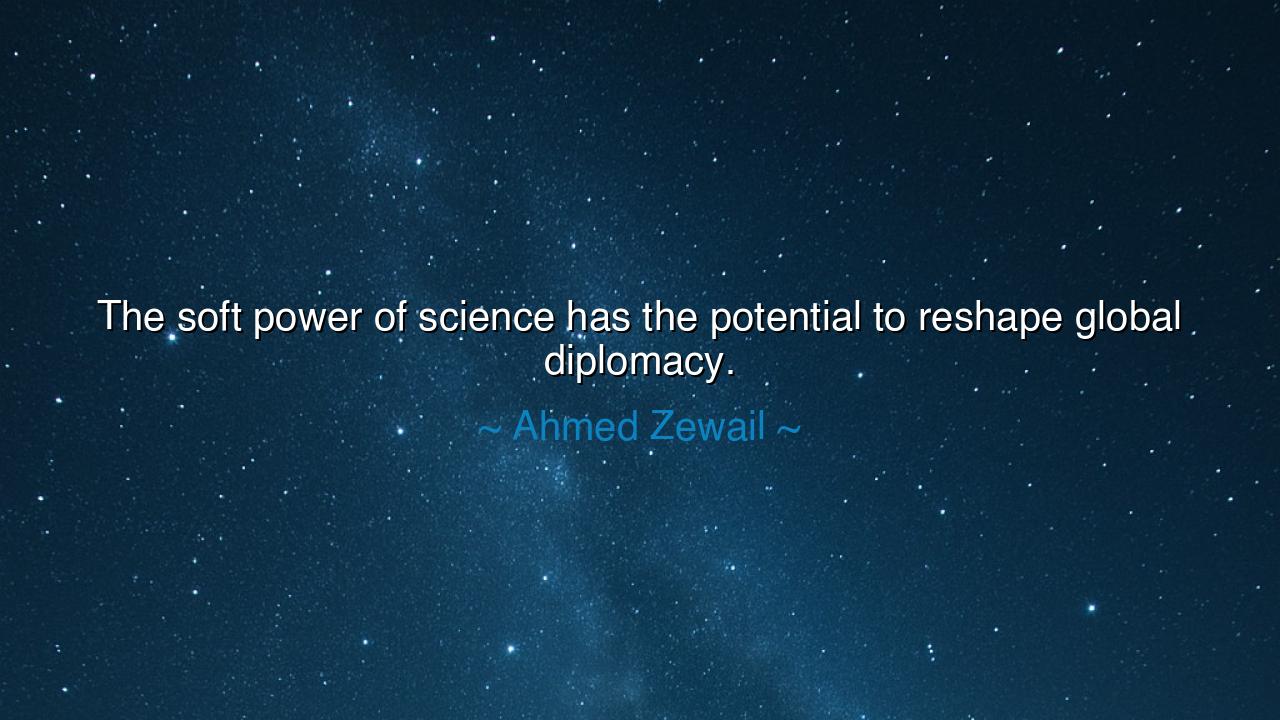
The soft power of science has the potential to reshape global






"The soft power of science has the potential to reshape global diplomacy." These words, spoken by the brilliant Ahmed Zewail, echo across the corridors of time and thought, casting a radiant light on the power that lies not in force or might, but in the quiet, transformative force of knowledge itself. In this statement, Zewail speaks of a force that transcends borders, transcends ideologies, and speaks to the universal truths of the world: science. It is not through weapons or trade agreements that the greatest changes will come in this new age, but through the quiet influence of ideas, discoveries, and collaborations that bridge the gap between nations and peoples. This is the soft power that Zewail refers to—a power that arises from the sharing of knowledge and the pursuit of human progress, one that can heal divisions and inspire unity.
The ancient world understood that power is not solely measured by the size of armies or the wealth of empires. In the days of Pericles and the Athenian Golden Age, power was measured by the wisdom and knowledge of a society. It was the pursuit of understanding the universe—through philosophy, through mathematics, through the study of nature—that defined the greatness of a civilization. The great minds of antiquity, like Socrates, Aristotle, and Archimedes, used their knowledge not only for personal enlightenment but for the betterment of the community. And thus, the seeds of soft power were sown long before the modern age. Knowledge, truth, and understanding were recognized as forces that could build bridges between people and nations.
In our time, the power of science has only grown more potent. It is no longer confined to the realms of scholars and philosophers, but it has become a universal language, a language that connects the hearts and minds of people across the world. Zewail’s words are a reminder that the soft power of science is one of the most formidable tools we have at our disposal. In a world torn by conflict, where diplomacy is often rooted in power struggles and political gamesmanship, science provides a foundation for peaceful collaboration. Whether in the development of life-saving medicine, the advancement of technology, or the fight against climate change, the collaborative nature of scientific discovery transcends national borders, offering a common cause for humanity to unite around.
Consider, for instance, the development of the Human Genome Project. This monumental effort, which brought together scientists from every corner of the globe, transcended national, political, and cultural boundaries. It was a collaboration of knowledge, driven by the understanding that the key to human health and well-being lay in the shared pursuit of knowledge. Nations set aside differences and worked together to map the human genome, unlocking secrets that could lead to new treatments and cures for the diseases that afflict humanity. Here, we see how science—through its pursuit of understanding—became a force of unity, of common purpose, and of collective human progress.
The soft power of science has been seen also in the cooperative efforts of nations working together on space exploration. The International Space Station, a joint project between the United States, Russia, Europe, Japan, and Canada, stands as a shining example of how scientific collaboration can transcend even the deepest political divides. In space, nations that might otherwise be rivals work side by side, united by a common cause—the exploration of the universe. Through the lens of science, the divide between East and West, between rich and poor, becomes less important than the shared pursuit of knowledge. This is the magic of soft power—it does not demand force or coercion but persuades through the universal appeal of knowledge and progress.
Yet, this power is not only for governments and diplomats. The lesson here is that we, as individuals, have a role to play in harnessing the soft power of science in our own lives. As Zewail suggests, it is through understanding and sharing knowledge that we can begin to bridge the divides that separate us. Whether in our work, our communities, or on the global stage, we are all capable of contributing to this force for good. Just as scientists collaborate across borders, so too can we collaborate in our daily lives to make the world a better, more connected place. Science calls us to see beyond our differences, to unite in our shared humanity, and to use our collective knowledge to solve the challenges that lie ahead.
In your own life, take a moment to reflect on how the soft power of science can guide your actions. Are you using your knowledge and talents for the benefit of others? Are you collaborating with others in the spirit of progress and understanding? Seek out opportunities to share, to connect, and to build bridges through the power of knowledge. The world’s most pressing problems—whether in health, technology, or the environment—will not be solved by force alone, but by the collaborative efforts of individuals who choose to unite through the pursuit of truth and understanding. This is the power of science—gentle yet transformative, capable of shaping the course of history, and leading us to a future of greater unity, peace, and prosperity.






AAdministratorAdministrator
Welcome, honored guests. Please leave a comment, we will respond soon